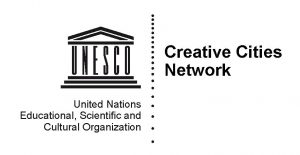The UNESCO Creative Cities Network (UCCN) was created in 2004 to promote cooperation with and among cities that have identified creativity as a strategic factor for sustainable urban development.
All 295 cities which currently make up this network work together towards a common objective: placing creativity and cultural industries at the heart of their development plans at the local level and cooperating actively at the international level.
The Network covers seven creative fields: Crafts and Folk Arts, Media Arts, Film, Design, Gastronomy, Literature and Music.
The UCCN aims to achieve the following objectives:
- strengthen international cooperation between cities that have recognised creativity as a strategic factor of their sustainable development;
- stimulate and enhance initiatives led by member cities to make creativity an essential component of urban development, notably through partnerships involving the public and private sectors and civil society.
- strengthen the creation, production, distribution and dissemination of cultural activities, goods and services;
- develop hubs of creativity and innovation and broaden opportunities for creators and professionals in the cultural sector;
- improve access to and participation in cultural life as well as the enjoyment of cultural goods and services, notably for marginalised or vulnerable groups and individuals;
- fully integrate culture and creativity into local development strategies and plans.
Within the UCCN, at the level of the member cities and at the international level, creative cities can make partnerships, share experiences and good practices, work on pilot projects and initiatives, take part in professional and artistic exchanges, study and research experiences of other creative cities, and work on policies and measures for sustainable urban development and on awareness raising activities.


